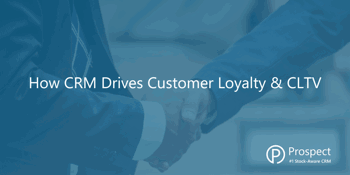
How CRM Drives Customer Loyalty & CLTV
 The right CRM system can give you a hold on some of the most insightful statistics that are otherwise inaccessible. Learning how CRM can better your daily business operations is just the first step to increasing customer loyalty and customer lifetime value.
The right CRM system can give you a hold on some of the most insightful statistics that are otherwise inaccessible. Learning how CRM can better your daily business operations is just the first step to increasing customer loyalty and customer lifetime value.
Using a CRM to increase customer conversion rates
Customer conversion rate is the percentage of potential customers who take a specific and desired action. For example, if you have 200 signups for your software in a month out of some 600 visitors, the conversion rate would be 33%. You can gain comprehensive information about your customer base and understand who you’re aiming to convert with the help of a CRM system. Using CRM automation, customers can be segmented for the implementation of specific and tailored campaigns that target the appropriate audience more effectively.
CRM systems can help to make intelligent, data-driven decisions. Their analytical tools allow businesses to unlock insights that are not immediately visible, providing a strategic advantage. Also, the ability to automate aspects of a business’s sales process can aid in converting potential customers to long term ones. It can be a huge time and budget saver for a Sales team as more time can be spent on selling, and less time is needed for engaging in non-selling activities.
How can CRM extend customer lifetime value?
Businesses often have the goal of building relationships, however, they may not understand how different these relationships can be from customer to customer. There are two types of customer relationships. The first, and not always the most effective, is a transactional relationship. This is an ideal type of relationship if your business is all about making one-off sales, where little to no rapport is necessary. So, a transactional relationship is completely focused on the short term, without any consideration for the ongoing demands of the consumer or the long term; the focus is solely on closing this unique sale. On the other hand, a relational relationship is where a business focuses on building long-term relationships, making sure they get to know their customer, as well as their needs and desires, to an individual level. Therefore, to make this switch in your customer relationships, you need to nurture and build upon the positive rapport you established during that first sale. The way a CRM system can do this is by showing descriptive information about customers, which can help your Sales team to propose exactly how their product perfectly fits with customer requirements.
CRM systems that offer RFM analysis automatically segment customers into mutually exclusive categories such as ‘At Risk’, ‘Needs Attention’, or ‘Promising’, so these groups can be differentiated when you’re targeting specific customers with campaigns. Identifying groups like these can stop customer churn from occurring. Another CRM feature, AI growth engines, can alert you to a missing order using automated calculations that discern when a customer should have placed an order based on previous spend patterns. This gives the company an opportunity to look at what their customers buy, analyse their needs, and build on their relationships as a means to prompt repeat sales. Being able to view who is lacking engagement can help businesses pinpoint which relationships need further attention, and make the change from a transactional to relational customer base.
Recording and tracking problems raised by customers is another significant benefit of implementing a CRM in your daily operations; it can help build rapport and trust. Team members from all departments will be able to see customer records comprising all the details from problems to documents, so everyone with access is on the same page. This results in smooth and consistent customer service, and these positive touchpoints will promote longevity in customer lifetime value (CLTV).
How CRM can improve customer loyalty
CRM can increase loyalty by identifying customer needs, giving businesses the ability to fulfil these needs and improve customer satisfaction. Through analytical insights, businesses have the knowledge to customise products so they meet each customer’s wants, and they can grasp the opportunity to upsell and cross-sell to clients. Constantly having individualised marketing strategies and campaigns will allow businesses to build strong relationships and gain an elevated level of trust. Changing the customer base from transactional to relational reinforces the rapport that is founded during the initial sale, increasing customer lifetime value by strengthening their trust in the products and services that you provide to them, and separating you from your competitors.
Prospect CRM is specifically designed to increase customer retention and maximise profits, and is the perfect software solution for growing manufacturers, wholesalers, and distributors. By signing up to Prospect’s 14-day Free Trial, you can see your integrated data in action and start driving CLTV immediately.
